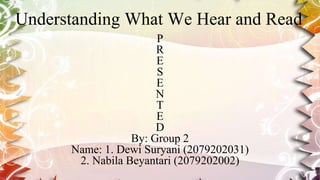Understanding what we hear and Read-1.pptx
•Download as PPTX, PDF•
0 likes•65 views
psycholinguistics
Report
Share
Report
Share

Recommended
Recommended
In this lecture we learn basic four language skill, how to improve the language skill. When come to the effective reading skills, they must use into the office and other personal and professional life.Week 6th lecture of the bba first semester by saniah saleem rao

Week 6th lecture of the bba first semester by saniah saleem raoVisiting Lecturer at Islamia University Bahawalpur, Bahawalnagar campus
More Related Content
Similar to Understanding what we hear and Read-1.pptx
In this lecture we learn basic four language skill, how to improve the language skill. When come to the effective reading skills, they must use into the office and other personal and professional life.Week 6th lecture of the bba first semester by saniah saleem rao

Week 6th lecture of the bba first semester by saniah saleem raoVisiting Lecturer at Islamia University Bahawalpur, Bahawalnagar campus
Similar to Understanding what we hear and Read-1.pptx (20)
Week 6th lecture of the bba first semester by saniah saleem rao

Week 6th lecture of the bba first semester by saniah saleem rao
Lsrw listening song lyrics lyrics in college call you later today or tomorrow...

Lsrw listening song lyrics lyrics in college call you later today or tomorrow...
LISTENING SKILLS OF ESSENTIALS OF COMMUNICATION.pdf

LISTENING SKILLS OF ESSENTIALS OF COMMUNICATION.pdf
Effective Listening skills slide share presentation by santhya

Effective Listening skills slide share presentation by santhya
Bonga Exit.pdf for fifteen course that enhance skills

Bonga Exit.pdf for fifteen course that enhance skills
Ch 14 strategies for successful speaking and successful listening

Ch 14 strategies for successful speaking and successful listening
Listening skills.pptx by lennah m. nzomo registered nurse

Listening skills.pptx by lennah m. nzomo registered nurse
Recently uploaded
God is a creative God Gen 1:1. All that He created was “good”, could also be translated “beautiful”. God created man in His own image Gen 1:27. Maths helps us discover the beauty that God has created in His world and, in turn, create beautiful designs to serve and enrich the lives of others.
Explore beautiful and ugly buildings. Mathematics helps us create beautiful d...

Explore beautiful and ugly buildings. Mathematics helps us create beautiful d...christianmathematics
Mehran University Newsletter is a Quarterly Publication from Public Relations OfficeMehran University Newsletter Vol-X, Issue-I, 2024

Mehran University Newsletter Vol-X, Issue-I, 2024Mehran University of Engineering & Technology, Jamshoro
Recently uploaded (20)
Basic Civil Engineering first year Notes- Chapter 4 Building.pptx

Basic Civil Engineering first year Notes- Chapter 4 Building.pptx
Explore beautiful and ugly buildings. Mathematics helps us create beautiful d...

Explore beautiful and ugly buildings. Mathematics helps us create beautiful d...
Mixin Classes in Odoo 17 How to Extend Models Using Mixin Classes

Mixin Classes in Odoo 17 How to Extend Models Using Mixin Classes
Unit-IV; Professional Sales Representative (PSR).pptx

Unit-IV; Professional Sales Representative (PSR).pptx
On National Teacher Day, meet the 2024-25 Kenan Fellows

On National Teacher Day, meet the 2024-25 Kenan Fellows
Asian American Pacific Islander Month DDSD 2024.pptx

Asian American Pacific Islander Month DDSD 2024.pptx
Food safety_Challenges food safety laboratories_.pdf

Food safety_Challenges food safety laboratories_.pdf
Understanding what we hear and Read-1.pptx
- 1. Understanding What We Hear and Read P R E S E N T E D By: Group 2 Name: 1. Dewi Suryani (2079202031) 2. Nabila Beyantari (2079202002)
- 2. Understanding language is an automatic task. Sounds or letters strike our ears or eyes in a swift and linear fashion creating words, which in turn very quickly form phrases, clauses, and sentences. Comprehension is more than the recognition of a sequential string of linguistic symbols. Readers and listeners use a great deal of information other than the actual language being produced to help them decipher the linguistics symbols they hear or see.
- 3. 5 Easy Ways to Remember and Understand Reading Long-Term 1. Use HOTS thinking mode. 2. Scanning reading technique. 3. How to quickly understand reading by skimming. 4. Make a mind map. 5. Apply repetition.
- 4. What we hear and see is influenced by psycholinguistics variables, not just the accurate perceptions of the sequence of sounds or words to hit our ears and eyes. Pay attention to both the actual words and for other clues to meaning, such as tone of voice or writing style. Look for opportunities for clarification and feedback. Communication involves the sharing and understanding of meaning. To fully share and understand, practice active listening and reading so that you are fully attentive, fully present in the moment of interaction.
- 5. 10 Steps To Effective Listening 1. Face the speaker and maintain eye contact. 2. Be attentive, but relaxed. 3. Keep an open mind. 4. Listen to the words and try to imagine what the speaker is saying. 5. Don't interrupt and don't force your “solution”. 6. Wait for the speaker to pause to ask a clarifying question. 7. Ask questions only to ensure understanding. 8. Try to feel what the speaker is feeling. 9. Give the speaker regular feedback. 10. Pay attention to what is not said—to nonverbal cues.
- 6. Here are some tips to facilitate active listening and reading: ● Maintain eye contact with the speaker; if reading, keep your eyes on the page. ● Don’t interrupt; if reading, don’t multitask. ● Focus your attention on the message, not your internal monologue. ● Restate the message in your own words and ask if you understood correctly. ● Ask clarifying questions to communicate interest and gain insight.